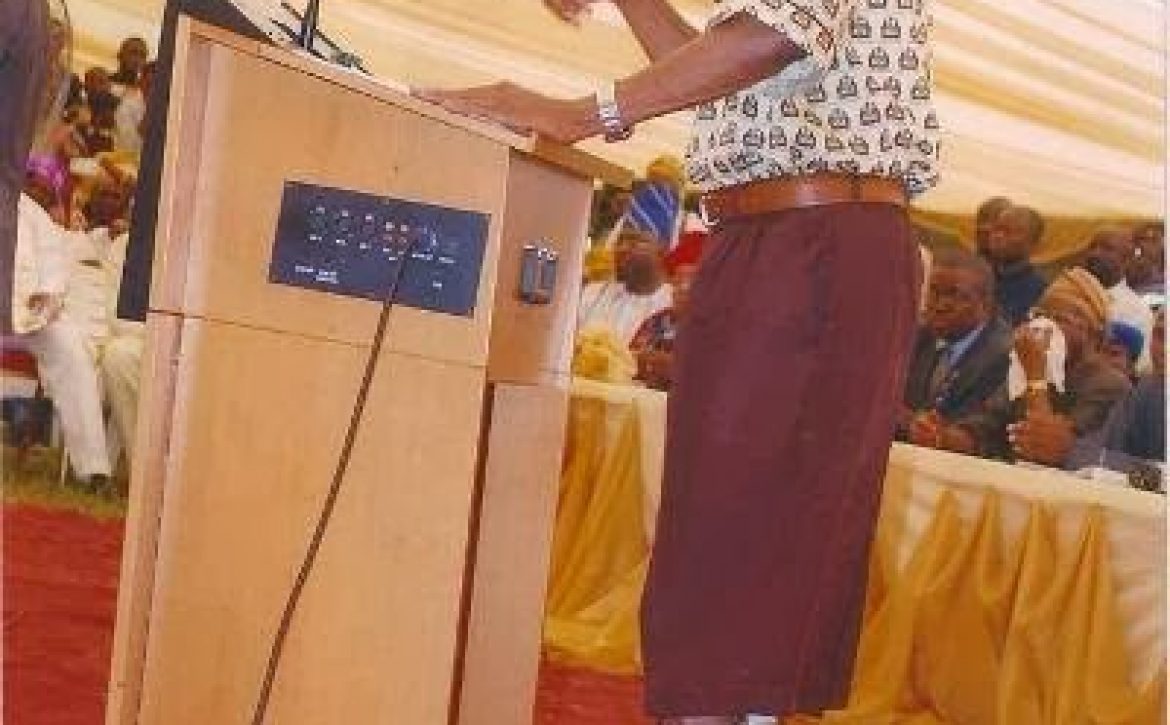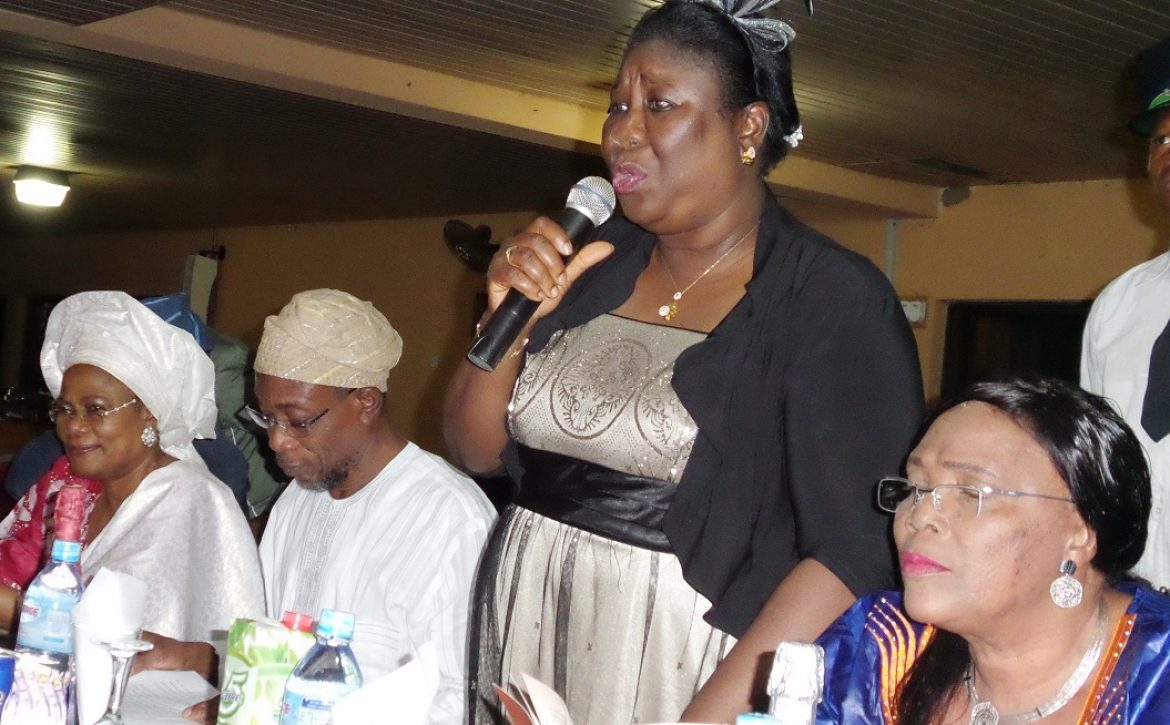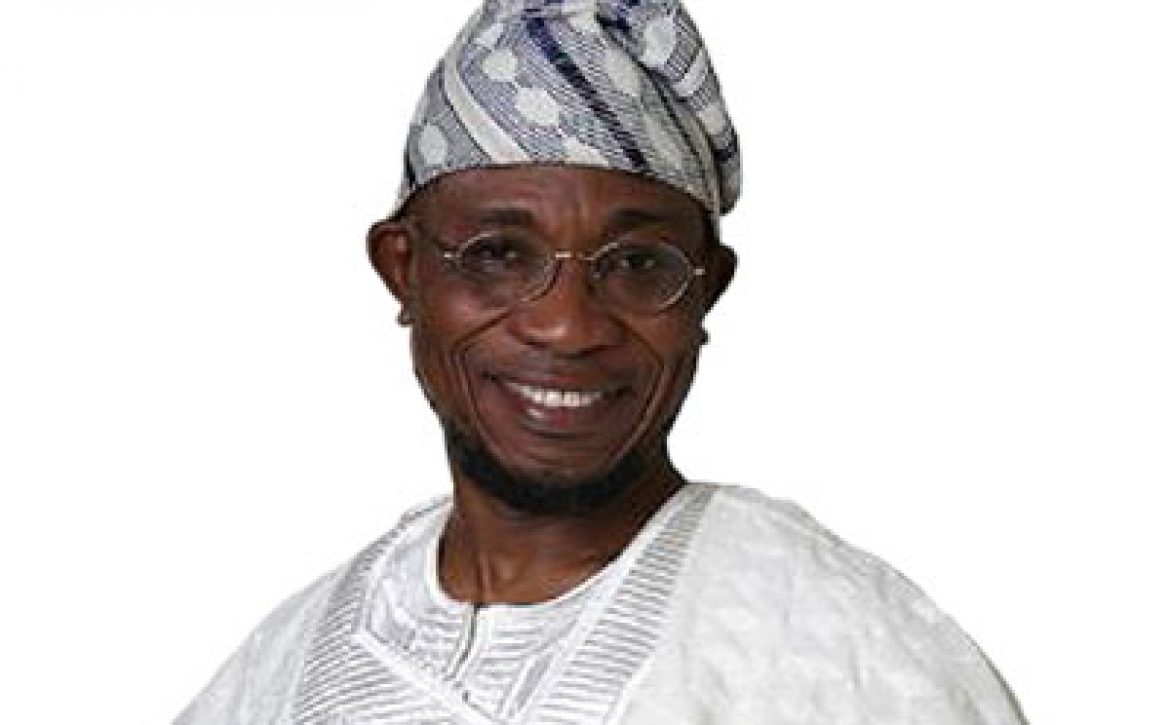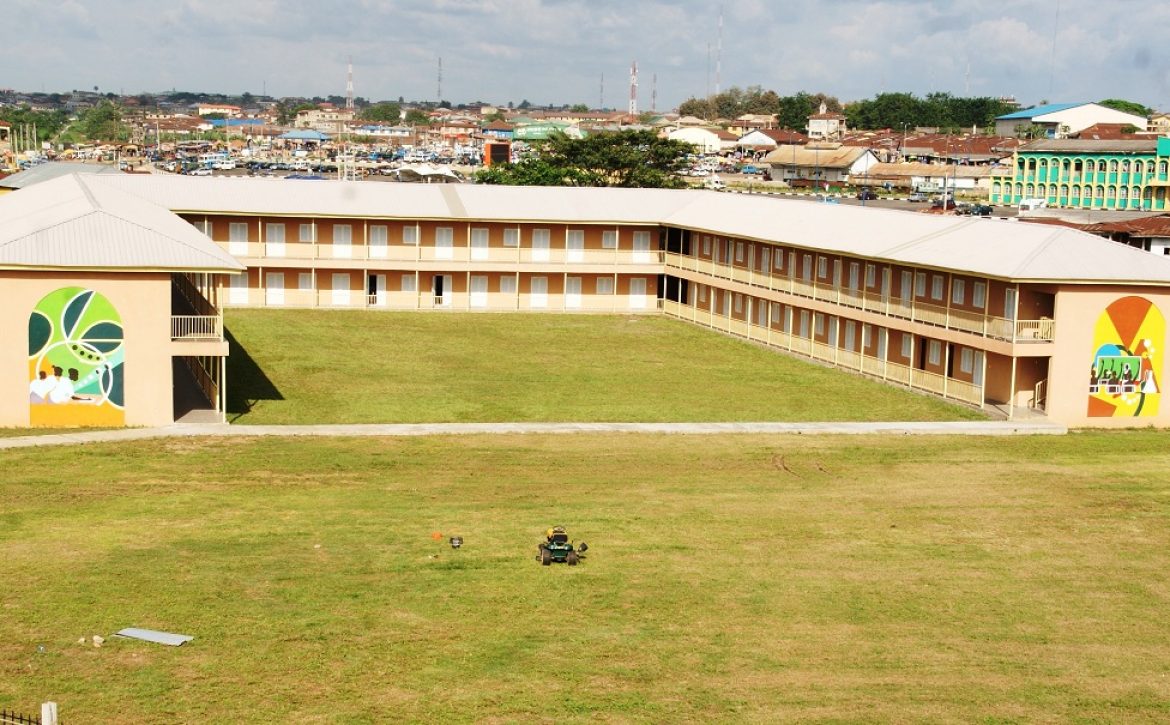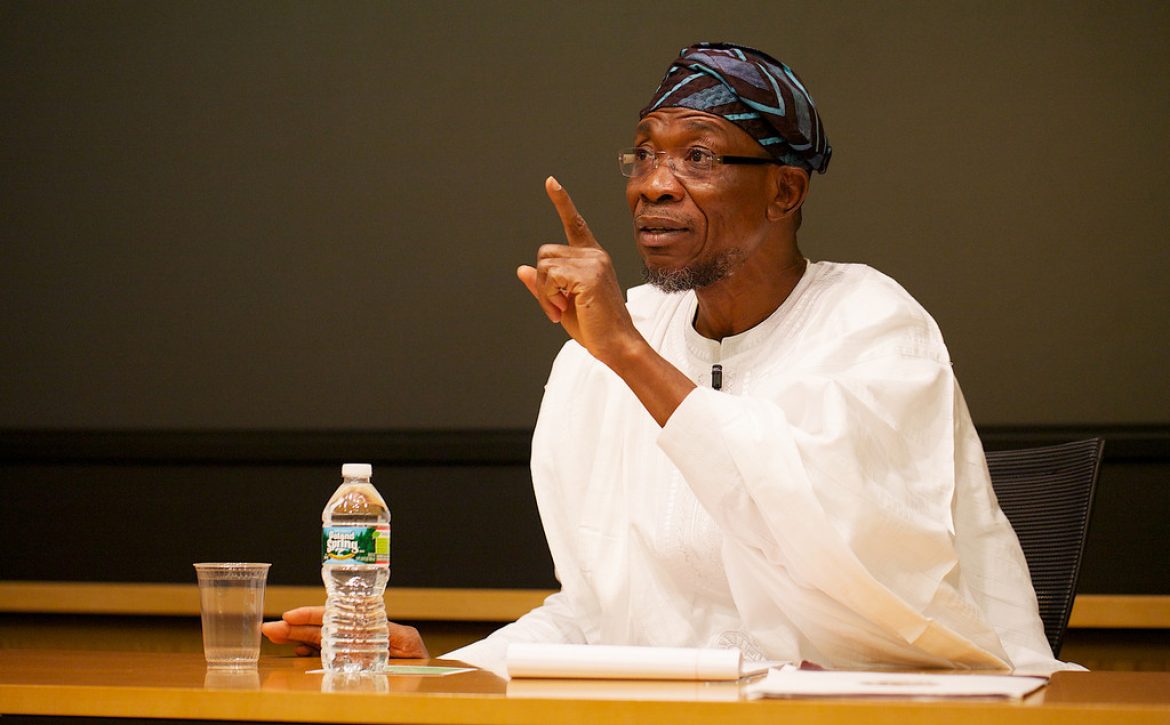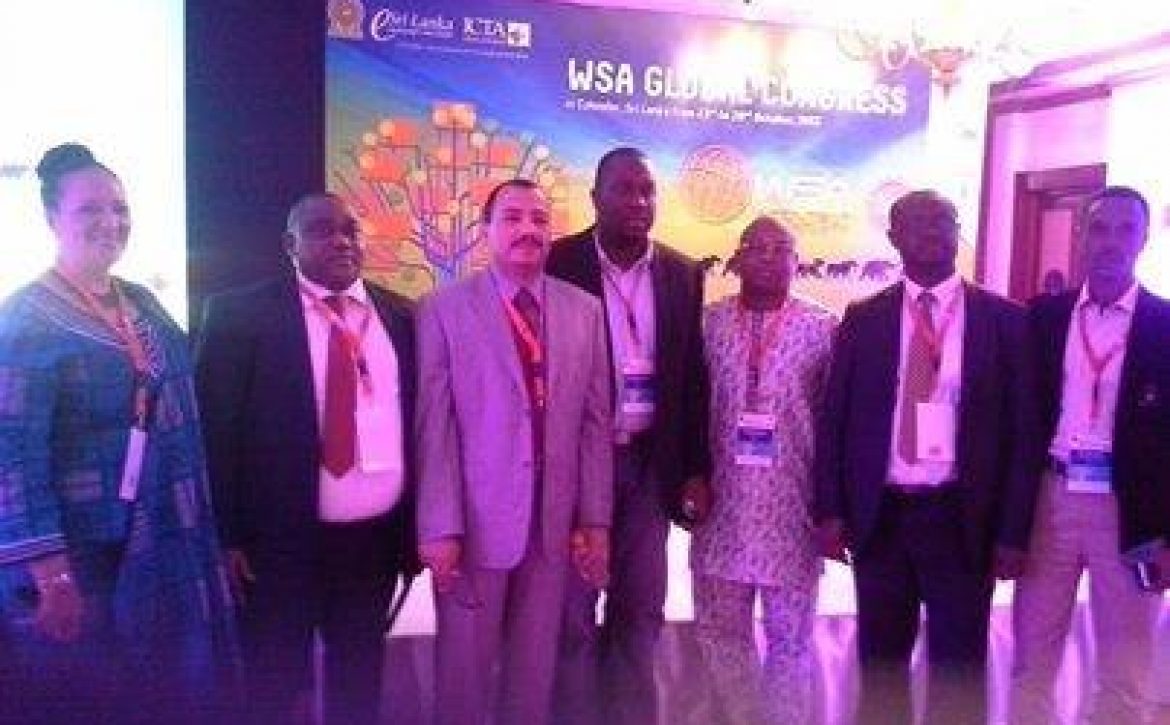 The Chapter of the Christian Association of Nigeria (CAN) in the State of Osun did not get their facts right about the Education Reform package of the State Government under Ogbeni Rauf Aregbesola. CAN has come up with very interesting but factually erroneous issues upon which the leaders of the organisation based its reservation to the implementation of some aspects of the reform. Specifically, CAN leaders said christian schools were merged with non-christian ones thereby compelling the christian students to attend (and possibly) learn non-christian doctrines.
The Chapter of the Christian Association of Nigeria (CAN) in the State of Osun did not get their facts right about the Education Reform package of the State Government under Ogbeni Rauf Aregbesola. CAN has come up with very interesting but factually erroneous issues upon which the leaders of the organisation based its reservation to the implementation of some aspects of the reform. Specifically, CAN leaders said christian schools were merged with non-christian ones thereby compelling the christian students to attend (and possibly) learn non-christian doctrines.
The CAN leaders also attempted to justify this erroneous view by pointing to the inclusion of the study of Ifa Knowledge in the school curriculum in the state. They also claimed that students of single-sex schools are pooled into mixed schools thereby changing the character of those schools. Now what are the facts? As part of the Education Reform package, the state government embarked on the building of ultra-modern schools with proper educational facilities. This material fact has not been denied by the CAN leaders because it is the real gospel truth.
The building of the schools across the state was in line with the reclassification of the schools in the state into Elementary, Middle and High Schools. The Elementary School is for children aged six to nine and it has grades 1-4 corresponding to the old primary 1-4. The ultra-modern Elementary Schools accommodate 900 pupils each. The Middle School would be for pupils aged 10-14 and it correspond to old Primary 5 to Junior Secondary School 3.
This has the new education grade system 5 to 9 while the last category, the High Schools accommodate those in the old Senior Secondary School Classes 1 to 3 having grade levels 10 to 12. Other components of the complete reform package has the free school feeding program, the computerisation of the school instruction and learning materials, as encapsulated in Opon Imo, the redesign of the school uniform and the reclassification of the schools. Let me quickly add here that the curriculum of learning was also improved upon by the inclusion of subjects that would make the children learn and understand our indigenous knowledge.
Now to the main issue of contest by CAN.
It is categorically not true that the Governor merged Christian schools with a non-Christian ones as there was no public Christian or Islamic schools in Osun. The schools which were affected by the reclassification were all public schools. Yes, it would be true to say some schools were originally established by Christian missions but 38 years ago, these schools were taken over by government and the original owners were adequately compensated. Since then, all these schools have lost the characteristic of the original founders and took on that of secularity.
So it would be wrong now to say Christian schools were being merged with non-Christian ones. On the surface, the argument of the CAN leaders that single-sex students are being pooled into mixed school might look sound on the ground of morals but experience has shown that this position is not. Indeed research findings on same-sex education has shown that separating girls and boys in classrooms made it difficult for them to learn how to efficiently and harmoniously work together. The American Department of Education also established that single-sex classroom or school practise does not guarantee success in education, rather other factors such as good learning environment and instructional materials do. Also, research has established that children spend their formative years in the classroom developing skills that will help them maintain relationships throughout their lives.
If a child has little exposure to the opposite sex, building meaningful friendships and even successful romantic relationships can be difficult. Research published by Dr. Lynn Liben in 2011 shows that there is strong evidence of negative consequences accompanying segregating by sex and that doing so promotes the development of negative gender stereotypes. Today, our society is full of undesirable homosexual behaviour. The population of Nigerian gay and lesbians are becoming so loud that there is advocacy for same sex marriage. Has CAN undertook research to know the effect of single school system on this? Emerging from this, the position of CAN leaders on single schools may not aid family unity as a child that goes through single school may grow up without appreciating the need for matrimonial harmony.
In any case, the rationale behind the school reclassification was the need to maximise the educational advantage to the students in the face of the lean financial resources available to the State. With the new schools, every student in the State would have access to better and more conducive learning environment which were hitherto unavailable for them in the old derelict schools.
The argument of CAN leaders on the inclusion of Ifa in the curriculum clearly pointed to the fact that they did not understand the need to promote Yoruba culture and knowledge so that it is saved from extinction. The Ifa divination system, which makes use of an extensive corpus of texts and mathematical formulas, is practiced among Yoruba communities and by the African diaspora in the Americas and the Caribbean.
This was established by the UNESCO and it was equally established that colonialism led to tagging such indigenous body of knowledge, which clearly established code of ethics and morals for our parents, as inferior to the religion or way of life brought by the colonial people hence the misconception that only two religions of christianity and Islam are sacrosanct. There is however no doubt from the point of the constitution and democracy that those who believe in IFA has the right as well to propagate such and now that the Ifa has been included in the curriculum, there are choices of what to study for the children. The need for choices underscored why no religious study was made compulsory in the State.
The truth is that Governor Aregbesola does not promote any religion in the schools in Osun. It is deliberate falsehood to try to twist this fact. In April this year, the President of Baptist Convention Rev. Supo Ayokunle underscored the unbiased nature of the governor when he stated that the Baptist Mission would continue to hold the governor in high esteem, as he had clearly demonstrated tolerance and peaceful co-existence among the people of all faiths.
The Rev clergy described Aregbesola as amiable, visionary, a gift to this generation, a friend and a man of the people. All these took place at the Baptist Convention. Nothing has changed in the inclusive and integrative manner the governor has related to every religion in the state. Just as the governor has stated in many of his public statements, his focus and attention is to enhance the standard of living of the people, especially children in the state. This is why every leader, social, religious and all should support the fundamental development efforts now taking place in the State of Osun.
THIS DAY
Category: Politics

For the first time in the history of the State of Osun, Governor Rauf Aregbesola last Tuesday hosted the members of the state judiciary to a dinner to mark the beginning of this year’s legal year.
The dinner, held at Banquet Hall, Government House, Osogbo, the state capital, had in attendance High Court judges, magistrates, members of the Nigerian Bar Association (NBA) and other judiciary members of staff.
Addressing the judges, Governor Aregbesola described them as the myth of government, making modern democracy functional.
He described Osun judges as “genuine priests in the temple of justice, who always protect public interests by upholding the law.
He said; “the law and order exit for the purpose of establishing justice and that is why a judge will sit and sentence someone to death or life imprisonment and such person will have no option rather than to die.
“ Without the law, the essence of human beings would not have been possible. Progress in the society depends upon the fairness, honourable and contentious adjudication of law on your part, otherwise, the society is set for doom”.
Aregbesola added that the current transformation in the state for the past 34 months was the product of a courageous judiciary.
“If not the courageous judiciary, one million individuals like me could not unseat Olagunsoye Oyinlola, but by law and its enforcement, we are here. If not law, the popular mandate of the people would have remained in wrong hands.”
This single example, according to the governor, underscored the importance of the judiciary in a democratic society to restore law and order.
Aregbesola also commended the Osun judiciary for quick dispensation of justice on the convicted kidnappers of the wife of the Speaker, Alhaja Muibat Salaam.
Speaking Earlier, the state Chief Judge, Justice Adepele Ojo, said the special dinner with the governor was the first of its kind in the state and commended the governor for his commitment to an efficient judiciary in the state.
OSUN DEFENDER
 Members of the Course 22 of the National Defence College, Abuja, on Wednesday commended the Governor of the State of Osun, Ogbeni Rauf Aregbesola, saying the youth employment, infrastructure provisions of the government are sterling.
Members of the Course 22 of the National Defence College, Abuja, on Wednesday commended the Governor of the State of Osun, Ogbeni Rauf Aregbesola, saying the youth employment, infrastructure provisions of the government are sterling.
The Course 22 members, who were on a courtesy call to the Governor, said they were highly impressed by the achievements of Aregbesola.
The team was on a study tour of the state with the theme: “Infrastructure as Catalyst for Development in the State of Osun: Issues and Prospects.”
Speaking on behalf of the team, Brigadier General Alani Okunlola, who is also the team leader, said the governor has recorded giant strides, which are interesting and intimidating.
General Okunlola said the team was highly impressed with ongoing and completed road projects in the state.
He said one of the most impressive things to the team is the recognition of the Osun Youth Employment Scheme (OYES) by the World Bank as a genuine effort of a government that intends to engage and empower youths.
“We have gone on a tour of road constructions in the state and we have seen a lot of huge projects.
“We saw many giant projects in the state, particularly the gigantic road projects going on. With what we have seen, we are highly impressed.
“We have seen giant strides that are quite interesting and intimidating to behold. We are also better educated about the efforts of government in developing the state.
“And one of the most impressive things to us is the recognition of OYES by World Bank as genuine efforts by a government willing to develop the capacity of its youth. We urge government not to relent in its efforts,” General Okunlola said.
Responding, Governor Aregbesola said that it is the infrastructure of a nation that creates wealth for that nation.
He said that for the people to be productive, infrastructure must be developed.
According to him, even with meagre resources coming to the state, government is making frantic efforts to develop its infrastructure.
“We are stimulated in our infrastructure efforts by the statement made by John Kennedy that roads in America are not the reflection of the wealth of the society but they are the cause of the wealth of society.
“If we can get our leaders to have clear understanding that the only way to promote productivity is for us to have solid and sound infrastructure. If you more borrow money to develop your infrastructure, it is the surest way for wealth creation.
“It is this simple logic that is lacking in our society. If we consciously develop our infrastructure, even within our limited resources, in the next 10 to 20 years we will be world leader.
“Here in Osun, what we are doing is to use our intellect to put up infrastructure however possible as means of stimulating a very high level of productivity. It is human production that creates wealth. Despite the state’s meagre resources, we have made frantic efforts to develop our infrastructure,” Aregbesola said.
He said that limited resources did not prevent the state from regular payment of salary as at when due, adding that from scarce funds the state employed 20, 000 OYES youths; is feeding 300, 000 elementary school pupils; produced the innovative e-learning tablet, Opon Imo; provides monthly monetary supports to critically vulnerable elders in the state among other social benefits enjoyed by the people of the state.
He commended the men of armed forces saying the greatest service is the one offered in the defence of one’s nation, saying this is the highest demonstration of zeal, patriotism and commitment.
He continued: “The greatest service is that of the defence of one’s nation. There can’t be higher service than that. When a man or a woman on his own volition, without any compulsion, decides to put his or life on the line for the defence of his or her nation, it is the highest demonstration of patriotism, commitment and loyalty.
“So, whenever I see officers and men in uniform who on their own volition volunteered their lives to the defence of their nations, I say that there can be no higher demonstration and commitment.”
GAZELLE NEWS
The efforts of the State of Osun Ministry of Education in ensuring strict compliance of both public and privates schools to the school curriculum guidelines and the regulation for the establishment of private schools has been emphasized.
The Permanent Secretary in the Ministry of Education, Mr. Lawrence Oyeniran who equally chaired the year 2013 WAEC State Committee meeting held at the Conference Hall of the Ministry, said Ogbeni Rauf Aregbesola had deemed it fit to make monitoring of schools and teachers learning facilities easy through decentralizing the Teaching Service Commission formerly known as TESCOM into three education districts with the appointments of Tutor General as Permanent Secretary into each of the district to support other education officers in the field.
Mr. Oyeniran who was represented by the Director of School Services in the Ministry of Education, Mr. Babatunde Durotoye maintained that the essence of the yearly meeting of the West African Examination Council (WAEC) Committee, which draws its members from various agencies and organizations in the State of Osun among which are the Nigeria Union of Teachers (NUT), Federal Ministry of Education, Civil Services Commission, ANCOPSS, PTA, among others is to appraise WAEC activities, deliberate comment and give possible suggestions that would improve the standard of WAEC examination and improve students’ performance in the State of Osun.
Mr. Oyeniran explained that the re-classification of schools policy of the government is in conformity with the national curriculum aimed at removing the rot in the education sector which has been warmly embraced by the parents and students who all want to enjoy the State of the art facilities provided in the new model schoolsHe used the occasion to appeal to the Branch Controller of WAEC in the State of Osun, Mr. Ayo Oluwafemi to release the statistical analyses of students’ performance to enable government reward the best 10 students in the year 2013 WAEC examination.
Briefing the members, the Zonal Coordinator of WAEC, Mr. Kafaru Babatunde Ola said, WAEC will not compromise its long standing records of zero tolerance for corruption and examination malpractices which has made it the best examination body in the Western part of Africa. He hinted that from the year 2014, any student caught with mobile phone during examination would have his/her entire result cancelled, while urging the Ministry of Education to officially issue a circular that will prohibit the use of mobile phone by students as well as embarking on public enlightenment programmes to enlighten students and parents.
Mr. Ola stressed that the fight against examination malpractices goes beyond individuals but a collective responsibility of all stakeholders in the education sector. He disclosed further that, the new Senior Secondary School Curriculum that make some subjects such as English studies, General Mathematics, Civic Education and Trade/Entrepreneurship studies compulsory will commence in the year 2014 but will be mandatory for all states in the year 2015.
OSUN NEWS PORTAL

Governor Rauf Aregbesola’s innovative education reform in Osun State is a step in the right direction, despite the controversy surrounding the “reclassification” of schools. A close study of various components of the ongoing reform and a long telephone conversation with the governor indicate that the reclassification is only an aspect of a larger policy aimed at improving educational outcome in the state.
But the policy could hardly be appreciated unless it is properly situated within its historical context. When Aregbesola assumed office in November 2010, Osun lagged behind in the South-West in the percentage of secondary school pupils who had credit passes in five subjects, including English Language and Mathematics. Besides, only about three per cent of secondary school-leavers in the state could go on to matriculate as university students.
Alarmed by this deplorable educational outcome, Aregbesola set up an education summit in February 2011, within three months of his assumption of office. The summit, made up of prominent scholars and educators, and headed by Prof. Wole Soyinka, drew upon best practices around the world in developing a blueprint for restructuring the educational system in the state.
In accordance with the blueprint, Aregbesola designed a policy, which calls for a comprehensive reform of primary and secondary education throughout the state. The overall goal of the policy is to find ways of better delivering the curriculum to all schoolchildren in the most successful and cost-effective manner; of establishing effective supervision and quality control measures; and of reducing costs, without sacrificing quality.
Realising the huge initial capital outlay required to implement such a policy, Aregbesola decided to adopt a gradualist approach. His first line of action was to provide exercise books for all schoolchildren, while textbooks and specially designed Tablets popularly called Opon Imo, were provided for primary and secondary pupils, respectively.
Next, the focus shifted to the prompt payment of running grants to primary and secondary schools throughout the state as well as full payment of the West African Examinations Council’s fees, averaging over N300m per year for all final year pupils in the state’s public secondary schools. To encourage the pupils to stay in school, a 90 per cent attendance rule was imposed. In order to keep the most vulnerable children in school and sustain their attention, the state embarked on providing free meals for pupils in Primary 1 to 4.
While these changes were going on, schools were redesigned in order to accommodate state-of-the classrooms, administrative blocks, library and computer facilities, and ample playgrounds. The new design led to the ongoing construction of 100 primary schools, 50 Middle Schools, and 20 High Schools across the state. Each school complex is designed to house about 1,000 pupils.
It was the physical realignment of schools and the need to group pupils according to age brackets and their needs that led to the reclassification of primary and secondary schools. The reclassification entails two major changes, namely, (a) the regrouping of classes and (b), the merging of schools in some major cities. Primary and secondary school classes are reclassified and renamed as follows: Elementary School (Grades 1-4); Middle School (Grades 5-9); and High School (Grades 10-12). For easy identification during school session, all students across the state are required to wear the same uniform.
True, the reclassification is still accommodated within the nation’s 6-3-3-4 education structure, the introduction of new nomenclature — Middle, High, Grades — is unnecessary as it contributes nothing to quality of instruction or learning. Besides, it masks the substantive and non-controversial components of a truly reformist education policy.
It also accentuates the controversy surrounding the merging of schools. Christians protested against it for blurring religious and gender boundaries in Christian schools. Specifically, they do not want coeducation and the wearing of Hijab in their schools. They also want their schools’ historical identity preserved in recognition of their Christian origins. The illogicality of their position lies in the government’s take-over of these same schools in 1978, some 35 years ago, with their funding, staffing, management, and supervision ceded to the government. Besides, mixed Christian schools already exist throughout the state.
Side by side with the religious protesters are opposition political parties, led by the Peoples Democratic Party, which condemns the reclassification as “an ill wind that blows no good”. It’s all part of the familiar PDP vs APC media fight.
The political, religious, and egocentric motivation for these protests is indicative of a political culture in which the politics of identity and self-interest overrides the politics of public interest and public good. This kind of politics ignores global trends in education, which indicate that no useful purpose is served by the separation of pupils on the basis of social cleavages. Rather, it is argued that more is gained by learners when they are able to draw on a diversity of religious, ethnic, class, and gender perspectives in the classroom.
When Aregbesola’s reforms are placed within a global context, we discover that they are reminiscent of ongoing reforms in major school districts in the United States. Faced with dwindling academic fortunes and a budget shortfall, the Philadelphia School District recently closed 24 schools and merged others in order to achieve cost effectiveness, efficient management and supervision, and improvement in standards.
This trend is not limited to primary and secondary education alone. In the State of Georgia, eight public colleges were merged into four, partly in response to continued state budget cuts but also to expand academic programmes, and improve quality. The editorial of Sunday PUNCH of October 20, 2013, implicitly recalls this trend when it advocated the pruning of Nigerian universities to a manageable number.
I happen to know first-hand that Aregbesola comes from a family of Christians and Muslims like many others in the South-West. Besides, I have not smelled an Islamisation agenda in the various components of his education policy that I have studied. What I see is a policy that will benefit everyone, and it should be allowed to move forward.
NIYI AKINASO VIA PUNCH

This Six Point Integral Action Plan derives from the cardinal development action points defined by the Rauf Aregbesola administration to realize the development agenda for the State. These are :
- Banish Hunger
- Banish Poverty
- Banish Unemployment
- Promote Healthy Living
- Promote Functional Education
- Promote Communal Peace and Progress
These six points are defined as integral because the delivery of the development vision requires a combined implementation of each of these points.
As such, to engender the development promise of ‘freedom for all, life more abundant” , our people must be able to : –
- Easily feed themselves so as to banish hunger
- Sustain a dignifying lifestyle so as to banish poverty
- Have a job to be engaged with so as to banish unemployment
- Easily access health care services so as to promote healthy living
- Acquire market relevant skills so as to promote functional education
- There should be peace and harmony for the benefit of our people, our visitors and businesses in our state so as to promote communal peace and harmony.
The first three points at a glance will appear “absolutist” in character. This character defines the “absolute optimism” required to inspire our administration and people to salvage itself from the abysmal and non-dignifying status our land has found itself in recent times.
This tone does not underestimate the challenges ahead rather it seeks to set as ambitious as possible a vision for our leaders and people to restore our dignity as a virtuous, independent and prosperous people.
The Six Point Integral Action Plan forms part of the manifesto defined by the Rauf Aregbesola team when contesting for office in the year 2007. The manifesto in the form of the famous Green Book had been defined two years earlier in 2005 to serve as the blueprint for the development agenda the Aregbesola team was to unfold. As fate will have it, Ogbeni Rauf Aregbesola will have to wait till the year 2010 to be declared Governor of the State to commence the implementation of his development agenda, which the people had earnestly yearned for.
Since assumption of office in November 2010, this Six Point Integral Action Plan has formed the foundation of the initiatives and programs of the State government of Osun.
For more on the State of Osun, visit our website at www.osun.gov.ng

The Global Congress of the United Nations World Summit Award which kicked off on Wednesday 23rd October, 2013, changed gear yesterday in the oceanic city of Colombo in Sri Lanka, after the presentation of OPON IMO (Tablet of Knowledge) by the ICT team from Osun led by Mr Bambo Bashorun, the Senior advisor on ICT to the digital governor of the fast-transforming State of Osun, South West Nigeria.
Keen interests generated by the phenomenal tablet during presentation led to the curiosity of other product winners and eminent persons about the unusual Governor doing unusual things in digital revolution in Nigeria.
Speaking with our reporters in Colombo after the Opon Imo presentation at The Kingsbury Hotel venue of the competition, the WSA National expert from Nigeria, Mr. Amos Emmanuel said “I join the world as they await the Executive Governor of the State of Osun, Ogbeni Rauf Aregbesola as he arrives Colombo, Sri Lanka.
Mr Emmanuel said further that “As a National Expert, I see that we could do better in economic development advancement and surpass visions and multi-pointed political agenda if leaders follow the footsteps of Aregbesola to truly promote e-content innovation in Education, Health, Tourism, Open Government and Data, eBusiness & Commerce, Inclusion and Empower, Entertainment, Media & Journalism… but ‘political gymnastics’ has been drawing Nigeria backwards to the point that the few developmental successes we made in the past have now faded and died natural deaths.”
“The victory of Opon Imo (Tablet of Knowledge) enhanced learning developmental initiative at the World Summit Award 2013 global Contest is heart-warming. Opon Imo has been greatly received and acknowledged by the WSA Grand Jury Panel of Judges in Estonia and Sri Lanka, the Youth Award Winners, other government organizations, NGOs and professional participants upon physical presentation of Opon Imo by government representatives from the State of Osun today in Kingsbury Hotel, Colombo, Sri Lanka.”
Congratulations to the State of Osun on this Opon Imo victory in far away Colombo, Sri Lanka.

I have, for weeks now, followed with keen interest what some people have chosen to call the merger of Christian and Muslim schools in Osun State. I had sought to understand the gist of the controversy but the matter got more intriguing by the day.
However, I was to discover, to my consternation, when I probed into the matter that the controversy is a needless exercise. What has been going on is sheer muck-raking borne out of mischief or a deliberate misinterpretation of the issue at stake. That is why an issue as straightforward as reclassification (not merger) of schools in Osun State has been made to assume a pugnacious dimension.
The Governor, Ogbeni Rauf Aregbesola has, in all of this, been accused of scheming to islamize Osun State. That accusation was a major spark that ignited my interest in the matter. I wanted to know how and why the governor would want to do that. I was interested in that because I had encountered the governor at close quarters where he had cause to explain the tag of Islamic fundamentalism usually placed on him. From his handling of the issue, the impression I get is that the man has nothing but pity for those who misread his intentions in this matter. He accuses them of intolerance.
That is why they cannot see beyond their noses and recognize that he has not allowed his religious faith to intrude into his official engagements. The governor would readily tell you that there are more Christians than Muslims in his cabinet. How then does this suggest that he is seeking to make Osun an Islamic State?
It is wild assumptions such as this that have been brought to bear on an issue that borders squarely and roundly on one of the action plans of the Aregbesola administration. On assumption of office in 2010, the administration outlined for itself a six-point action plan one of which was to provide the state with functional education. The plan became necessary in view of the rot that has taken over education in the state over the years.
The administration has since rolled up its sleeves in its pursuit of this objective. This has given rise to the reclassification of the schools in the state into Elementary, Middle and High Schools. The reclassification was one of the recommendations of the O’schools (meaning Osun schools) Committee set up to deal with the perceived issue of neglect and decay which schools in the state suffered over the years. Under the arrangement, the state is now building state of the art schools. The idea is to censure that the state meets the standards set out by the United Nations Educational and Scientific Organization (UNESCO) and by so doing consolidate the gains of education in Nigeria.
However, the measure, as laudable as it is, had consequences for the old order. It has led to a situation where some existing schools have become empty. Under that circumstance, some schools within the same locality have had to merge in order to have the requisite enrollment figure.
Naturally, a situation such as this could cause disquiet in some circles especially since people are usually resistant to change. But one salutary thing about it all is that the government, from the information obtained from the Ministry of Education, never forced anybody into any school. The choice has remained that of parents and guardians of the schoolchildren. Going by the tone and direction of the controversy, you would think that there are schools in the state that are owned by Christians or Muslims.
But the fact of the matter is that all the public schools in the state are owned and run by the government. This is has been so since 1975 when the then Western State took over all schools in the South West. What this means is that mission schools exist only in name, not in fact. It is therefore difficult to understand how the issue was made to assume a religious connotation when it actually has none. For the rational analyst, it is easy to see why the wind had to blow in the direction of religion. We live in a land where politics is brought into everything we do.
For a state like Osun which will go into elections very soon, every issue can be made to take on a political colouration. For the opposition, politicizing the reclassification of schools could be a potent tool to discredit the administration in the state. To achieve this, situations have to be interpreted out of context or even falsified in order to score a cheap political point. This is what the Aregbesola administration has had to contend with recently.
But the issue must be divested of its hysterical undertone if we must arrive at the truth. And the truth here is that Osun is confronted with a man of conviction who pursues whatever cause he believes in single-mindedly. Having undertaken, in the best interest of the state, to give education a new lease of life in Osun State, Governor Aregbesola has been taking uncommon steps to realize his lofty dreams for the state.
I recall what transpired on the day Opoimo, the tablet of knowledge, was launched in the state. The innovation embedded in the computer tablet was real. It has, since then, effectively rendered books redundant in the school system in the state. This is because it contains over 50 books which cover the 17 subjects taught in schools in the state. With it, Osun will no longer have a situation where pupils will be deficient in certain subjects on account of their inability to buy the books prescribed for them. The tablet therefore makes education in the state cheap and affordable.
But it certainly will not make sense to just throw the opon -imo at the pupils without providing a proper learning and teaching environment. The reclassification of schools is aimed at streamlining the curricula of the school system and also eliminate multiplicity of schools in the state.
Beyond that, the new order in the state is bound to arrest out of school syndrome. The Elementary segment of the three categories of schools in the state ensures that pupils are provided for by the government. The pupils are given free meals and this has encouraged many who were out of school before to return.
Unlike the razzamatazz that obtains in some states in the name of free education or educational reform, there is something unique about the Osun example. The Opon Imo revolution and the reclassification of schools in the state are landmarks that cannot be wished away. They constitute a formidable challenge to those who seek to take over the affairs of the state from Aregbesola. The man came with these ideas for all times. It can be safely said that he has delivered on his promises. When he leaves, history will recognize him as someone who came and made appreciable impact on his environment. To seek to unseat such a man is therefore a tall order.
If our system permits meritocracy, those who seek Aregbesola’s job should be put on the spot. The people should be interested in knowing what they have in stock for the state. They need superior argument to do this. If they fail, then they would have given the man in the saddle a free ticket for his return trip. This should be the challenge the opposition should confront. Raking up muck over issues that are already settled will lead to nowhere.
BIO REPORTS

It is yet another giant stride and a great honour bestowed on Ogbeni Rauf Aregbesola, the Governor of the state of Osun by the world summit award (WSA)
The World Summit Award (WSA) is a global initiative for selecting and promoting the world’s best electronic media and applications. Comprising of eminent national experts from more than 100 UN member-states,
WSA nominated 461 national nominees to compete against each other to win the World Summit Award 2013 out of which 5 outstanding nominees of various WSA categories emerged from Nigeria namely with Opon Imo in the e-Learning & Science Category.
The Award Ceremony and Gala Dinner which will hold at Mount Lavinia Beach on the 26th of October will be the highlight of the WSA Global Congress wherethe 40 WSA and 18 WSYA winners will be celebrated for their excellence in a unique ceremony and winners from all over the world will receive their awards, handed to them by high-level international dignitariess.
Based on his achievement and style in facilitating a revolution in education and the agriculture sub-sector of the economy, Ogbeni Rauf Aregbesola has been picked to be one of the guest speakers at this international event.
Constantly improving on the educational facilities needed by the students of the State, the idea and exceptional execution of Opon Imo (e-tablet) has earned the State this outstanding recognition. Amidst recent distractions and citicisims, the fact remains that Ogbeni has made us proud yet again and we celebrate him.
Congratulations to the Governor for this award and honour brought to the state of Osun through this creative project that cuts across every strata of his governance. We truly believe that there are more to come considering other ongoing projects in the State at the moment.
Long live Ogbeni , Long Live the state of Osun and Nigeria.
 The Government of Osun on Thursday said it had launched a sensitisation campaign to encourage payment of tax by residents.
The Government of Osun on Thursday said it had launched a sensitisation campaign to encourage payment of tax by residents.
Mr Femi Balogun, the Senior Special Assistant to the Governor on Internal Revenue Service, disclosed this in an interview with the News Agency of Nigeria ( NAN) in Osogbo.
“Government sees the need to be proactive about the issue of tax so that our people can get to know what they stand to benefit from paying tax. It is also comfortable for us to go to the streets to educate our people on why they have to be part of positive change and contribute to the efforts of government. Apart from being a source of revenue for government, it is also a way of ensuring involvement in governance and developments,” he said.
Balogun also said the sensitisation campaign was necessary to discourage tax evasion especially among business men and women.
He said revenue officers had been trained and equipped on how to approach traders on matters relating to tax, adding that it was imperative for people to see tax payment as their responsibility to the state.
“We have carried out a street sensitisation programme at the popular Oke-fia market and this campaign will be taken to other major markets in the capital and other towns. Our people are responsible, what we are doing now is to let them see reason why they have to be part of development. Tax payment is not punitive but a way of having a say in government,’’ he said.
(NAN)


